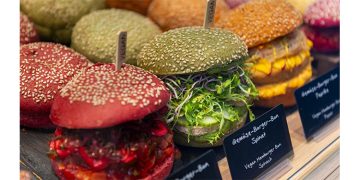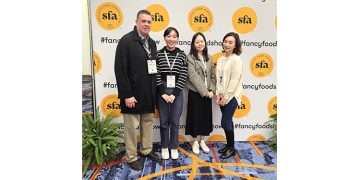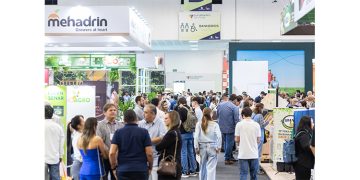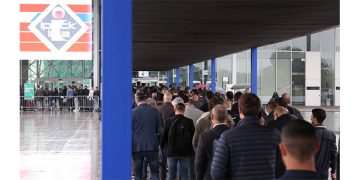* Undefeated Indian Shouldering National Hopes in Global Showdown
* UAE’s Re-export Role in Global Coffee Trade Crossroads Falls Under Gulfood Microscope
DUBAI – As the UAE’s undefeated Turkish coffee-making champion, Indian Karthikeyan Ranjedran is pinning his hopes on a genetically-engineered Kenyan coffee bean to ward off 20 international challengers and secure his adopted homeland’s first World Cezve / Ibrik Championship title.
Having emerged victorious in last October’s National Cezve / Ibrik Championship at Dubai World Trade Centre (DWTC), Ranjedran will represent the UAE when the 21st Gulfood hosts the ninth World Cezve / Ibrik Championship from 21-25 February 2016.
Owned and organized by the Specialty Coffee Association of Europe (SCAE), Gulfood’s hosting of the competition, dedicated to the centuries-old art of brewing coffee in a ‘Cezve’ or ‘Ibrik’ – the small, long-handled pot – marks the contest’s Middle East debut.
“It’s a tremendous honour to represent the UAE and the hundreds of nationalities that call the country home,” said Ranjedran. “I’m a little nervous but it’s a great opportunity so I’m going to give it my best. I believe I can make it because I have the right beans, the right technique and the right team behind me.”
A 23-year-old barista from the southern Indian city of Pondicherry who works for Dubai’s Raw Coffee Company, Ranjedran will use Kenyan coffee bean supplier Scot Labs’ SL28 – a genetically engineered hybrid bean spliced from the genes of Tipica and Mokka from Yemen and Bourbon from the Indian Ocean French colony of Réunion Island.
“The SL28 bean was made in a test-tube in a Kenyan laboratory,” says Ranjedran. “I’ve chosen it because of its very medium roast profile. The SL28 is a beautifully delicate bean and very fruity with hints of raspberries, blueberries and only mild malic acidity. I tested the bean extensively before the nationals because you have to make 10-20 cups to find the perfect roast point – the bean fits my personal preference perfectly.”
Insisting there is no secret to his Ibrik technique and no special ingredient that tip the scales in his favor, Ranjedran puts his success down to the age-old adage that practice makes perfect.
“I was always a home barista and a big coffee drinker,” he adds. “I used to make lots of coffee variations at home a long time before I ever dreamed about entering a competition. Trial and error is still a huge part of my process. Every coffee is different because each bean has its own profile; there is a lot of fine-tuning and calibration because the character of coffee changes with varying conditions such as humidity.”
With an undefeated 2-0 record in competitive coffee-making formats, Ranjedran knows he will have to be at his best to fend off a field of baristas from nations as diverse as Uganda, the Philippines, Nepal, the Czech Republic, Greece and Italy, represented by reigning world champion Davide Berti.
“If I’m honest, I don’t know much about the other baristas,” said Ranjedran. “I just want to learn new techniques because you gain so much in these competitions, the baristas share so much knowledge that I can take back to my regular work. I want to serve my customers the best cup of coffee in Dubai.”
With world-class baristas such as Ranjedran ensuring coffee consumption across the Middle East continues its upward trend and the UAE now one of the region’s major re-export hubs for coffee trading, the dark brown beans will fall under the microscope like never before at the 2016 edition of the world’s largest annual food and hospitality trade show.
Of the 70 countries worldwide that produce coffee, major exporters Brazil, Vietnam, Indonesia, Columbia, Ethiopia, India and Mexico will all be present at Gulfood 2016, while buying delegations from the world’s largest traditional importers – the United States and Japan – will network with specialist coffee trading, roasting and packaging companies from emerging markets across the MENA region, South Asia and Africa.
Dubai Customs and Dubai Multi Commodities Centre (DMCC) reported the emirate’s coffee exports rising at an average annual rate of 57 per cent – or from USD 5.9 million to USD 22.4 million – between 2010 – 2013, the same year Euromonitor International named the UAE the ‘world’s fastest growing market’.
The biggest edition in the show’s history, Gulfood 2016 will attract 85,000-plus visitors from more than 170 countries including international heads of state, ministers, government officials and national trade associations from five continents.
Gulfood 2016 is a strictly trade-only event for business and trade visitors. The show is open 11am-7pm from February 21-24 and 11am-5pm on February 25. Visitors can pre-register at www.gulfood.com to save AED100 (US$ 27) on the AED300 (US$ 81.70) on-site entry fee.
More coffee business brewing in the UAE
* Traders, Suppliers and Equipment Manufacturers Look to Leverage Bullish Regional
* Hospitality and Mass Grocery Retail Forecasts at Gulfood 2016
The UAE’s coffee market is expected to grow by over 30% in the next four years as the country’s trading hub emerges as a key supply cog in the global coffee supply chain.
With domestic demand continuing an upward surge with over 4,000 tea and coffee houses now operating in the country and 82% of the population saying they consume coffee each day, according to Zagat, the F&B online resource, the UAE is increasingly seen as both a growing consumer and re-export market for coffee beans and refined finished product.
Euromonitor International says the country sits at the center of a region which now accounts for eight per cent, or US $6.5 billion, of the US $85 billion global consumer spend on coffee – and that this could increase by up to a third by 2030. In 2014, the UAE alone spent $121 million on coffee consumption.
The forecast comes as no surprise to Trixie LohMirmand, Senior Vice President, Exhibitions & Events Management, Dubai World Trade Centre (DWTC), which is witnessing huge space demand from suppliers, traders and roaster and finished product equipment manufacturers at Gulfood. The 21st edition of the world’s largest annual food and hospitality trade show runs February 21-25.
“Coffee is more than just a drink in the Middle East, it is an inherent part of the culture, a leisure pastime and business pre-requisite. Add to this the region’s rising population and the UAE’s anticipated hospitality boom in the run-up to Expo 2020 Dubai and the growth landscape is obvious.
“Other shifting trade patterns are now also coming into the equation with new growers, such as Angola, gaining ground and revitalisation predicted for countries such as Yemen. A scenario for evolving trade development is emerging and we expect to see more signs of it at Gulfood 2016.”
Of the 70 coffee producing countries worldwide, major exporters Brazil, Vietnam, Indonesia, Columbia, Ethiopia, India and Mexico will all be present at Gulfood 2016. In addition to buyer delegations from the world’s two largest traditional importers – the United States and Japan – attending the show, Gulfood will welcome more than 200 specialist coffee manufacturing, trading, roasting and packaging companies from around the world. Coffee sector exhibitors range from the UAE’s Karam and other emerging markets players from the MENA region, South Asia and Africa, to household heavyweights Lavazza and Illycaffé (illy) from Italy.
Coffee though is only one commodity on the receiving end of a bright UAE outlook in the final years of this decade. Global macroeconomic research firm BMI International says the country’s consumer outlook “remains bright” to 2019 even in an environment of lower oil prices.
“Existing high levels of spending, combined with rapid private consumption growth, will create premiumization opportunities across the food and drink industry, while volume growth will be more limited due to the country’s small population,” says a recent BMI forecast. “We also hold a positive view on the mass grocery retail sector, especially the convenience segment, which will benefit from increasingly time-poor consumers and increasing numbers of women entering the labor force.”
BMI has forecast the UAE’s current 5.7% annual compound growth rate in food consumption will rise to 7.7% by 2019, with total soft drinks sales rising from the current CAGR of 7.5% to 7.7% and mass grocery retail (MGR) sales rising 10.1% CAGR until the onset of the next decade.
BMI says the prospects for the food and drink market in nearby Saudi Arabia are even stronger despite what it determines are “short-term economic headwinds.” Its forecast to 2019 says a number of factors will impact an upward trend in the Kingdom. “Sales will continue to benefit from rising disposable incomes, favourable demographics, increasing urbanisation and ongoing formalisation of the mass grocery retail sector,” it says.
BMI says Saudi Arabia will lead the way in a regional MGR upswing with year-on-year total food consumption growth of 7.3% CAGR until 2019. Per capita food consumption growth in the Kingdom will rise from the current CAGR of 4.6% to 5.4% to 2019, while the value of total soft drinks sales will reach 6.9% CAGR growth to 2019 and MGR sales will climb 8.9% CAGR to the same period.
“All analyst indicators point to considerable business opportunities for the sector across the retail and hospitality sectors with both undergoing sizeable growth and modernisation,” explained LohMirmand. “Convenience retailing is now being pursued more aggressively within the retail segment while the regional hospitality sector continues growth strategies linked with expanding national and regional tourism ambitions.”
It’s against the bullish national and regional cross-sector background that DWTC anticipates this year’s Gulfood will attract 85,000-plus visitors from more than 170 countries, including international heads of state, ministers, government officials and national trade associations from five continents.















